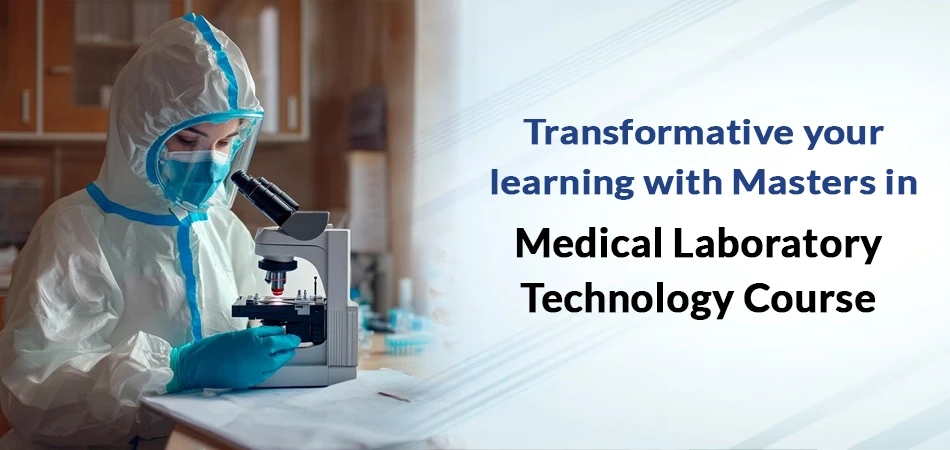Transformative Your Learning with Masters in Medical Laboratory Technology Course

The Masters in Medical Laboratory Technology (MMLT) course is a comprehensive and rigorous program that prepares students for leadership roles in the dynamic and constantly evolving field of laboratory science. By combining theoretical knowledge with extensive practical experience, this course offers transformative learning opportunities that equip graduates with the expertise necessary to thrive in their careers.
If you're considering enrolling in an MMLT program, choosing the top paramedical college in Delhi is an essential step toward enhancing your career prospects. Below are key takeaways that demonstrate how the MMLT course can profoundly impact your professional journey:
1. Advanced Technical Skills
One of the most significant outcomes of the MMLT course is the development of advanced technical skills. Students gain hands-on experience with the latest laboratory techniques, including molecular diagnostics, automation in laboratory processes, and advanced microscopy techniques. This training enhances both technical proficiency and confidence, empowering graduates to tackle complex laboratory procedures with competence and ease. Mastery of cutting-edge technologies ensures that students are well-prepared for the evolving demands of the medical laboratory field.
2. Understanding Clinical Relevance
The MMLT course emphasizes the practical importance of laboratory work in the clinical setting. Students learn how to interpret and apply laboratory results to influence patient treatment decisions. By connecting the dots between laboratory science and patient outcomes, the program fosters an understanding of the broader impact that medical laboratory professionals have on healthcare. This clinical relevance empowers graduates to use their expertise to make a real difference in patient care, ensuring more informed and effective treatment decisions.
3. Research and Critical Thinking
In addition to technical training, the MMLT program nurtures research skills and critical thinking. Students are encouraged to engage in research projects that address current challenges and innovations in medical laboratory practices. These projects help develop a problem-solving mindset and a strong foundation in evidence-based decision-making. Through this, students gain the ability to critically evaluate and implement improvements in laboratory processes, which is vital in driving innovation in healthcare settings.
4. Interprofessional Collaboration
A standout feature of the MMLT course is its focus on interprofessional collaboration. Students work alongside peers from various healthcare disciplines, such as nursing, medicine, and allied health, gaining valuable experience in team-based patient care. This collaborative approach enhances communication and teamwork skills, preparing graduates to work effectively in multidisciplinary healthcare environments. This holistic understanding of healthcare delivery helps students appreciate the critical role of medical laboratory professionals in the broader healthcare system.
5. Ethics and Professionalism
Ethics and professionalism are integral components of the MMLT curriculum. Students delve into topics like patient confidentiality, informed consent, and the ethical implications of laboratory results. These discussions ensure that graduates are well-versed in the ethical responsibilities that come with working in healthcare. The program fosters a strong sense of integrity, preparing students to navigate the complex ethical issues they will encounter in their careers with professionalism and care.
6. Adaptability in a Changing Field
The field of medical laboratory technology is continuously evolving, driven by advancements in technology, innovative diagnostic methods, and changing healthcare practices. The MMLT program equips students with the skills to adapt to these changes, ensuring that they remain at the forefront of the profession. By instilling a growth mindset and emphasizing the importance of lifelong learning, the program prepares graduates to embrace new technologies and methodologies throughout their careers.
Key Takeaways from the MMLT Course
The MMLT course provides students with specialized training in a variety of technical, clinical, research, and ethical domains, preparing them for successful careers in the field of medical laboratory science. Graduates gain:
- Advanced technical expertise in cutting-edge laboratory techniques.
- A deep understanding of the clinical significance of lab work in patient care.
- Research experience that fosters critical thinking and innovation.
- The ability to collaborate effectively with other healthcare professionals.
- A strong ethical foundation that ensures professionalism in healthcare settings.
- The skills necessary to adapt to a rapidly evolving field.
By enrolling in a well-established institution like Ganesh Paramedical College in Delhi, students can access high-quality education, online courses, hands-on training, internships, and financial assistance, making it a great choice for those looking to pursue an MMLT program.
Enrollment Opportunities and Support
If you're looking to advance your career in medical laboratory technology, Ganesh Paramedical College offers a comprehensive MMLT program designed to provide students with the best opportunities for academic and professional growth. With expert faculty, state-of-the-art facilities, and a strong emphasis on practical skills, this program is an excellent choice for those eager to make a significant impact in the healthcare field.
Enroll now to kickstart your journey towards becoming a leader in the medical laboratory technology field
Frequently Asked Questions (FAQ)
Q1. Do paramedical courses require NEET?
No, NEET is not required for paramedical courses. However, some colleges may have their own entrance exams or criteria for admission.
Q2. Is there any entrance exam for paramedical courses?
Yes, some paramedical courses may require entrance exams for admission. Common exams include JIPMER, NEET-UG, MHT CET, and others.
Q3. How many years is a paramedical course?
The duration of paramedical courses varies depending on the level of study. Certificate courses typically last 1-2 years, while degree courses can range from 1-4 years.
Q4. Is paramedical a good career?
Yes, paramedical careers offer a wealth of job opportunities. With the increasing demand for healthcare professionals, the need for trained personnel in paramedical fields is on the rise, making it a promising career choice.

